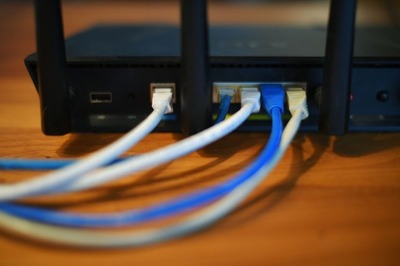
views
Washington: Federal agents have determined New York Governor Eliot Spitzer used a high-priced call-girl ring at least eight times in recent months, and agents had him under surveillance twice this year, sources familiar with the investigation said Wednesday.
Sources say New York Governor Eliot Spitzer used a call-girl service eight times in recent months.
Spitzer announced his resignation Wednesday, two days after reports of his connection to the Emperors Club VIP became public.
He has not been charged with a crime.
He told reporters Wednesday, "I cannot allow my private failings to disrupt the people's work."
The resignation will take effect Monday.
The sources said the investigation began when New York's North Fork Bank notified the Treasury Department about suspicious transfers of money from Spitzer's bank accounts.
That investigation led agents to the alleged organisers of the prostitution ring, four of whom were charged in a criminal complaint last week, the sources said.
A grand jury in New York is likely to hear evidence in the case soon, said Kathleen Mullin, an attorney who said she represents one of the ring's employees. Mullin would not identify her client, but said she was not the woman identified only as "Kristen" linked to Spitzer in court papers.
She said her client and other women who worked for the Emperors Club have been asked to testify before the grand jury.
Asked if her client had any encounters with Spitzer, Mullin said, "We have no information regarding the governor."
Wiretaps on suspected members of the ring, authorised in January, yielded more than 5,000 telephone calls and text messages and another 6,000-plus e-mails, according to court papers. In those intercepts, the organisers told clients how to arrange and pay for their trysts, a federal agent's affidavit states.
The affidavit identified clients by number, with Spitzer designated "Client 9," a source with knowledge of the investigation told CNN this week. Sources familiar with the investigation said federal authorities Wednesday were trying to clamp down on leaks of the investigation's details. Video See a timeline of the investigation »
The affidavit states "Client 9" paid $4,300 for 2.5 hours with a call girl he arranged to meet at Washington's Mayflower Hotel, with some of that a deposit on a future session. Court papers state he also paid for train tickets, cab fare, mini-bar and room service charges for Kristen -- a 5-foot-5, 105-pound brunette he arranged to meet the night of February 13.
Kristen is a 22-year-old would-be singer from New Jersey, The New York Times reported Wednesday.
The newspaper said Ashley Youmans -- now known as Ashley Alexandra Dupre -- was identified in court documents as Kristen.
Dupre has not been charged with a crime. She made a brief appearance Monday in US Magistrate Court as a witness against four people charged with operating the Emperor's Club, the Times said.
In an entry on her MySpace page, Dupre says she left "a broken family" and "abuse" in 2004, eventually settling in Manhattan "to pursue my music career."
"I am all about my music, and my music is all about me," she writes on her MySpace page. "It flows from what I've been through, what I've seen and how I feel."
Dupre's mother, Carolyn Capalbo, told the Times she and her daughter were close, adding that "she obviously got involved in something much larger than her."
Spitzer, whose squeaky-clean image as a corporate corruption-buster made him a rising Democratic star, testified to the House Financial Services Committee the next day about the affect of the mortgage meltdown. He took a state plane from Buffalo, New York, to Washington and back to New York, his office confirmed Tuesday.
Sources told CNN that FBI agents had Spitzer under surveillance at the Mayflower that night -- and on an earlier occasion, on January 26, when no prostitute showed up.
His resignation is unlikely to affect decisions about whether he will face prosecution, the sources said. His attorneys were negotiating Wednesday with the US attorney's office in New York in an effort to avoid criminal charges, a source told CNN.
But in a statement issued after the governor's resignation, U.S. Attorney Michael Garcia said no agreement had been reached between his office and the governor "relating to his resignation or any other matter."
According to two sources who spoke Tuesday with CNN, Spitzer hit the federal radar when a bank reported to the Internal Revenue Service that a significant amount of money had been suspiciously transferred from one account to another.
Late last year, upon investigating the movement of money that the bank initially reported, the IRS found that the accounts were connected to Spitzer, the sources said.
The IRS contacted the FBI, which joined the case to investigate the possibility of government corruption.
Federal law requires a banking institution to file a suspicious activity report when the institution suspects a transaction is linked to a federal crime. More specifically, banks are required to report to the IRS any transactions totaling $5,000 or more if the transactions "involve potential money laundering or a violation of the Bank Secrecy Act."
The act requires businesses to keep documents that are useful for identifying and investigating money laundering.
After receiving the IRS report last year, the FBI Corruption Squad linked the account transfers to a prostitution ring, according to sources. The FBI criminal division joined the probe to look into the prostitution ring, while the federal corruption team continued its investigation into Spitzer.
Legal experts not involved in the case have said Spitzer could face some type of money-laundering charge, such as structuring a financial transaction to evade federal bank reporting requirements by breaking up a large transaction into smaller ones.
Sources tell CNN that prosecutors have considered pursuing a structuring charge, but have run into some difficulty. And Richard Smith, a former Justice Department official, said structuring charges are "fairly difficult to prove."
"You are going to have to prove that he withdrew sums of money with the intent to evade the reporting requirements, to conceal the fact that he is withdrawing the money," said Smith, the former deputy chief of the Justice Department's fraud section.
"Because if the money was withdrawn, it appears if his lawyers are correct, in a manner that he didn't conceal anything, it begs the question whether or not they can prove the reckless intent that he withdrew this money in small sums to avoid the reporting requirement."
Spitzer also could face charges related to the Mann Act, which makes it a federal offense to transport someone across state lines for the purpose of prostitution. But sources tell CNN that the government is less interested in pursuing charges for prostitution than on following the money.

















Comments
0 comment